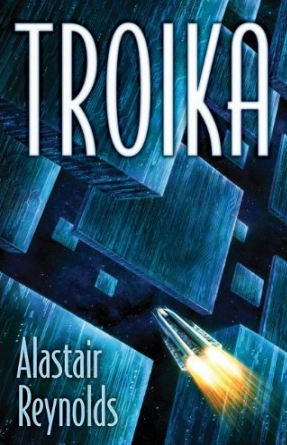By Anthony Biondi (The Cascade) – Email
Print Edition: November 2, 2011
 Troika, a novella by Alastair Reynolds which was released in June, takes place in the bleak near future, at the dusk of scientific progress and the shut down of the space program globally. After a mysterious object known as the Matryoshka appears suddenly in Earth’s local solar system, all of humanity struggles to understand what it is. During its large orbit around the sun, it makes three apparitions. Each appearance brings humanity closer to understanding the object’s mystery, yet drives the debate of its origin deeper. On the third apparition, a manned team is sent to investigate the object. The team struggles through stress, fear, and insanity within the closed environment of the shuttle; suffering from something close to cabin fever. The team struggles to gather samples of the alien object, while combating their own stresses. When their unmanned probe becomes stuck, they enter the device, and become changed forever.
Troika, a novella by Alastair Reynolds which was released in June, takes place in the bleak near future, at the dusk of scientific progress and the shut down of the space program globally. After a mysterious object known as the Matryoshka appears suddenly in Earth’s local solar system, all of humanity struggles to understand what it is. During its large orbit around the sun, it makes three apparitions. Each appearance brings humanity closer to understanding the object’s mystery, yet drives the debate of its origin deeper. On the third apparition, a manned team is sent to investigate the object. The team struggles through stress, fear, and insanity within the closed environment of the shuttle; suffering from something close to cabin fever. The team struggles to gather samples of the alien object, while combating their own stresses. When their unmanned probe becomes stuck, they enter the device, and become changed forever.
The team then has to struggle through government control, as they find that the world fears the power of this device. The government is denying the truth to the people, and burying it in the past. They are lead through a thrilling narrative of identity, control and the fall of science.
Troika is a steady-paced science fiction novella, of a similar vein to Michael Crichton’s Sphere, and Arthur C. Clark’s A Space Odyssey. It carries itself with a healthy level of mystery, all the while exploring the prospect of our near future and our humanity. As we come to the age of the closing of the American Space program, the world in Troika seems to be a haunting reflection of our own choices in the world of science.
The novella itself is rather standard of the genre, bringing nothing new to the table as far as twists and turns are concerned. A close reader would be able to predict the ending with some accuracy. Although, the saving grace of this novel is the way in which it is written. The simplicity of the style and the characters allow the reader to become involved and enraptured in this plausible reality without becoming caught up in the details. The narration flows smoothly and paces itself in an articulate manner. Though the science of this novel is still present, it is not a looming hindrance as it can be in other novels of the genre.
Reynolds is a long time author of the science fiction genre. He has a history of astrophysics, thusly making his worlds and his science all the more believable. His narratives have come a long way from being choppy, science-ridden masses, becoming a well-paced mystery. Though Troika still struggles to build three-dimensional characters and exercise perfect dialogue, Reynold’s writing is still some of the better the genre has to offer.
Although the novel becomes hung up in places, Troika is still a fun and entertaining read that leaves you thinking. Reynold’s has proven once again that science fiction has the potential to explore the world around us, as well as our own humanity, and has earned his place along side the science fiction greats.


